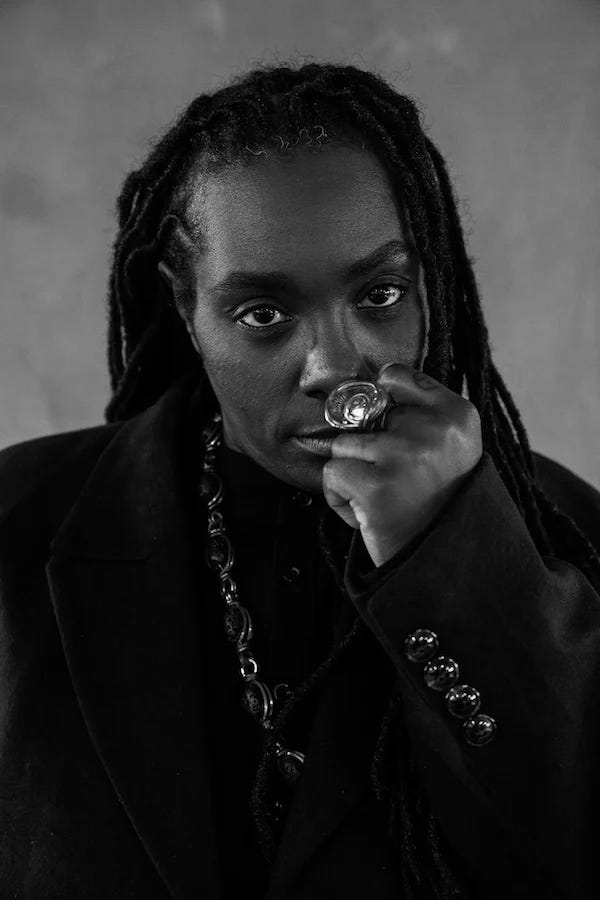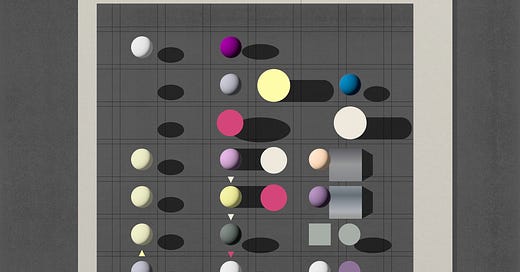Herb Sundays 109: Jlin. (Apple, Spotify).
Art by Michael Cina
“I always find it interesting when creating a playlist because sometimes I can be so moody. I love old school music as you can never go wrong in my opinion. I hope you all enjoy my selections." - Jlin for Herb Sundays
Jlin (Jerrilynn Patton) has such an extensive bio it would bogart this whole newsletter, so I’ll let you look up the details. Her backstory as a math nerd and Gary, Indiana steel factory worker is one of the greatest there is. Her passport is stamped with legends, from her Footwork mentors RP Boo and DJ Rashad to designer Rick Owens, to visual artists like Kevin Beasley and Nick Cave, and of course, SOPHIE and Kronos Quartet.
In a new interview with Sam Davies for Mixmag, the super-composer origin story of a young Jlin is revealed:
“Um… yeah,” she says, on a Zoom call from Gary. “When I listen to Philip [Glass], he’s so present in his work. In my work, I feel like I’m very present. I feel like you can feel my frustration, like, within a piece.”
“the teenage girl who in 2004 was so transfixed by The Hours’ crystalline score — developed an obsession with Glass’s music. “That’s how I got introduced to Phillip’s work,” she says. “I started listening to his expression of the piano … I’ve always felt like he was never minimalist. He always maximised the hell out of those keys.”detailed and meticulous exploration of rhythm’s inner and outer reaches has made her one of the most distinctive and recognizable voices within both the electronic and new music worlds.
Indeed 20 years later the two have collaborated on ‘The Precision Of Infinity (ft. Philip Glass)’ over a decade after what Davies says Jlin had been “releasing some of the loudest, fastest, most powerful music ever committed to WAV.”
Indeed her debut Black Geometry caught my, and many other’s attention back in 2017, and her successive growth both on record and in collaboration, has been a steady and patient build. Unlike many Chicago-area legends of Footwork and House legends who gain fair attention far too late in life, or sadly, only in death, Jlin being celebrated real-time is a timeline I’m glad to live in.
When listening closer this week, the other secret sauce in her music is that it's not loop-based, which gives it room to take flight. Jlin riffs indeed feel like a 5AM Phil Glass-impov’d ditty because it is just as alive in nature. I dropped in on Jlin’s album listening party on Bandcamp last week, one of my fave micro-spaces for collective listening these days, and caught this exchange:

Jlin’s new album Akoma indeed feels like a career best, and not only since the album features guest appearances from Glass, as well as Björk and Kronos Quartet, its that these heroes are meeting her on her terms, the act is mutual. It’s hard to beleive we’ve lived with Jlin for nearly a decade, as she still feels fresh. Every few years or so, an artist from the electronic underground catches critical light outside of their usual circle, and Jlin has kept hold of this attention.
Jlin’s success is also a good example of the Interdependent music scene, coined by Jlin collaborators Holly Herndon and Mat Druyhurst. Indeed the support of a credible and trailblazing indie label like Planet Mu has been an asset, who alongside labels like Hyperdub, have forged a path for bass music that has helped mainstream press get their heads around it in album format without diminishing its raw power in the process. Also, you need good publicists and journalists to spread the signal, and Gamall Awad and his Backspin Promo company (whom Ghostly worked closely with in its early days) have helped open access to larger publications. There’s a lot of talk about new models, but seeing examples like these, how the indie/inter scene could work, and we need to fight to continue this artery in music.
Jlin was recently interviewed by
for Tone Glow, who have been responsible for some of the most interesting interviews in modern music in recent years. This isn’t shade on anyone else, as there is also a noticeable lack of paid column space for emerging artists these days. Part of Jlin’s triumph, to me, is that being recognized in the canon of New Music circles, without having to separate her footwork/club work in the process. In the interview, there’s a touching moment of recognition:Jlin: …My mother told me a while ago that I was a composer and I told her I wasn’t. I was like, “I’m trying to be a footwork artist,” and she was like, “I hear you, but you’re a composer.” I didn’t wanna hear her at that time. It’s funny. So fast forward to 2017 when I do Wayne McGregor’s piece, sure enough when I walk up to my dressing room, on the outside of the door it says “Composer Jerrilynn Patton.” I remember before I walked in I said, “Mom is always right.” (laughter).
That tension between classical and electronic seems to be resolving but has likely taken too long. There has been a litany of electronic/classical records, usually centered around DJ/producers recording with an orchestra, and there have been some compelling moments (I love this version of “Acid Eiffel” by Laurent Garnier, my colleague Molly Smith shared with me) but these aren’t records I usually go back to.
Indeed the joy of Akoma, is indeed this “recognition” of greatness from her peers, her fans, her heroes, and herself. The goal is to make this less of an anomoly, but Jlin is a shining light of what is possible.






